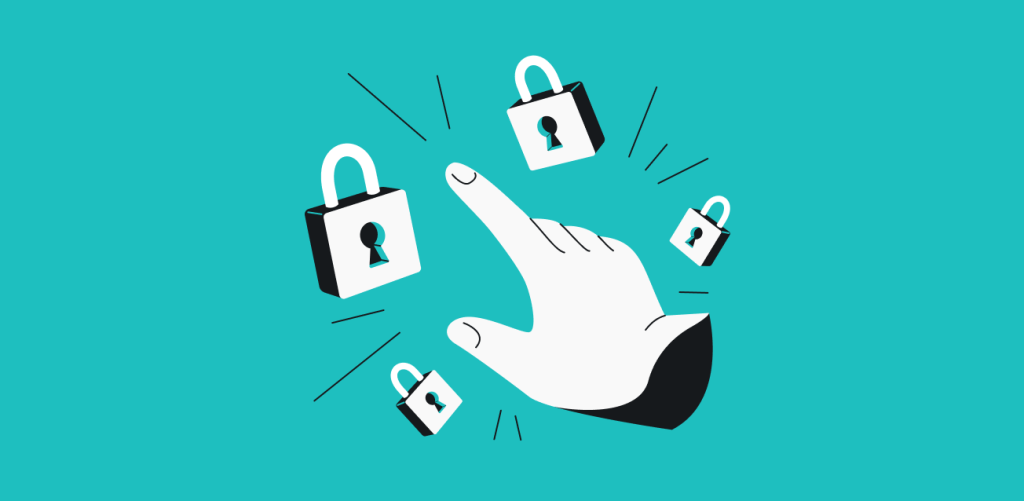
No one likes seeing the buffering icon on their screen. And yet, it sometimes happens when you’re using a Virtual Private Network (VPN) to protect yourself from snoopers.
Your connection is slightly slower when using a VPN because your traffic must first reach a VPN server. But it’s a small price to pay for your privacy online, considering that premium VPN providers only slow down your connection by 10-20%. In many cases, the impact of a VPN on connection speed can barely be felt.
That being said, there are some things you can do if your VPN connection is slow. In this post, you will find 8 tips and tricks for improving VPN speeds.
Table of contents
Is it really a VPN at fault?
A VPN may slow down your connection because of how VPNs work and the processes needed to keep you safe online. But before you use any of our recommended tips on making your VPN faster, check if a VPN causes a drop in your internet speed.
To check that, turn off your VPN and access the internet to see if you still have a fast connection through your Internet Service Provider (ISP). The quickest option is to run a speed test and see if the internet speed picks up without an active VPN connection.
If the internet speed stays slow, your issue has nothing to do with a VPN. ISP throttling or limitations on your internet plan may cause it.
Still think that your VPN connection causes the issues? Here’s how you can speed it up:

How to make your VPN faster:
- Change your VPN server location
- Change your protocol settings
- Switch between TCP/UDP with OpenVPN
- Turn on MultiHop
- Restart your device
- Restart your router
- Turn off your security software
- Ditch your wireless connections
Change your VPN server location
Switching your VPN server is probably the first thing you should try. The location of your VPN server will affect your internet speed depending on the distance between the server and you. The further you are from the server, the slower your connection.
When you’re connected to a VPN server that is far away, there’s a lot more latency, which is the time it takes to send a request to a server or receive a response. That’s a physical fact you can’t do anything about, no matter how hard you want to increase the VPN speed.
That’s why you should change your VPN location to far-off servers only if you want to appear as if you’re in a specific country. If the location doesn’t matter to you, and you only want to protect yourself online, choose the server closest to you.
You should also consider server load when choosing a server to connect to. A jam-packed server will be slower than one with fewer users, so pick one that’s not super busy.
Disclaimer: We prohibit using Surfshark services for any unlawful purposes as it is against our Terms of Service. Please be sure to act in compliance with all applicable laws and regulations of streaming service providers.
Change your protocol settings
Each VPN protocol utilizes specific encryption standards to encrypt the tunnel for data sent between you and a VPN server. Some of these protocols are willing to sacrifice performance for top-tier security, while others will do the opposite.
WireGuard is the most modern, fastest protocol on the roster, so switch to that one if you haven’t already. IKEv2 and OpenVPN are two reliable standbys, but they’re not as fast.
Switch between TCP/UDP with OpenVPN
If you’re working with OpenVPN, which is sometimes your only option, you can switch between transmission protocols to increase VPN speed. OpenVPN functions with either TCP (Transmission Control Protocol) or UDP (User Datagram Protocol).
UDP is faster but less reliable when it comes to actually delivering packages, so it’s usually used for live video streaming. Try switching from TCP to UDP to speed up your VPN connection.
Turn on MultiHop
This one seems a bit counter-intuitive when it comes to making a VPN faster, but sometimes it does work.
If your VPN supports this feature, turn on MultiHop (also known as Double VPN). Depending on your country, the network between the first MultiHop server and the second might be better than what you’d get joining directly, thus automatically improving VPN connection speeds.
Restart your device
Ah, yes, the old reliable “Have you tried turning it off and on again?” method. Unsurprisingly, sometimes it helps with a slow VPN connection as well.
Your VPN service uses complex encryption to ensure that your data is safe and secure. This might cause a minor conflict with the device and operating system that you’re using, which can also sometimes result in the VPN no longer working. Your operating system may be overwhelmed and need a new programming instruction set, so just reboot.
You can also try using a different device with the VPN (here’s one situation where Surfshark’s unlimited installs come in handy) to see if this helps your situation. It may be due to the settings on your device, which are causing the interference.
Restart your router
The solution to your problem may be as simple as closing your current program and restarting the router. There’s a tendency for systems to accumulate junk as they work for extended periods, though it’s less prevalent these days. Stopping and restarting the connection allows your application to begin with a new data set.
Turn off security software
Firewall and antivirus software filters the data that goes out of your device. This process may be slowing down your connection.
You can switch off the security software to check if it’s causing the issue. Keep in mind that doing so makes your device more vulnerable to malware. Therefore, you should leave your antivirus and firewall on when using a VPN, even if it does make the connection slightly slower.
Ditch your wireless connections
Wireless connections give ease and comfort at the expense of speed and stability. Part of the blame for this is associated with using shared channels on multiple devices.
A wired connection will provide less latency. Your wireless connection is susceptible to interference from objects located in the path between your device and router — like walls, furniture, and other electronics. Wires bypass all that by being physically there, resulting in a faster internet connection.
Boost your VPN speed today
It’s important to have a fast connection for basically everything you do online outside of reading Wikipedia. Follow the tips above for maximum VPN security and accessibility with minimal impact on your connection speed.
FAQ
Does a VPN slow down my internet speed?
Yes, using a VPN will slow down your internet speed. There’s simply no way around it. But there are things you can do to make your VPN connection faster. Connecting to a server closest to you and choosing the fastest protocol available definitely helps.
How do I stop my VPN from slowing down my internet?
If you are experiencing a slow VPN connection, there are a few things you can do to make it faster:
- Change your VPN server location;
- Change your protocol settings;
- Switch between TCP/UDP with OpenVPN;
- Turn on MultiHop;
- Restart your device;
- Restart your router;
- Turn off security software;
- Ditch your wireless connections.
Can a VPN increase internet speed?
A VPN can help overcome ISP throttling, a common cause of slow internet speeds. So while it won’t directly make your internet faster, a VPN can definitely help with connection speeds.
What is a good VPN for fast internet speed?
Surfshark is a great option if you are looking for a fast VPN. It is one of the fastest VPN service providers on the market today. All thanks to 10Gbps servers, the fastest protocols, and 4,500+ servers in 100 countries.


